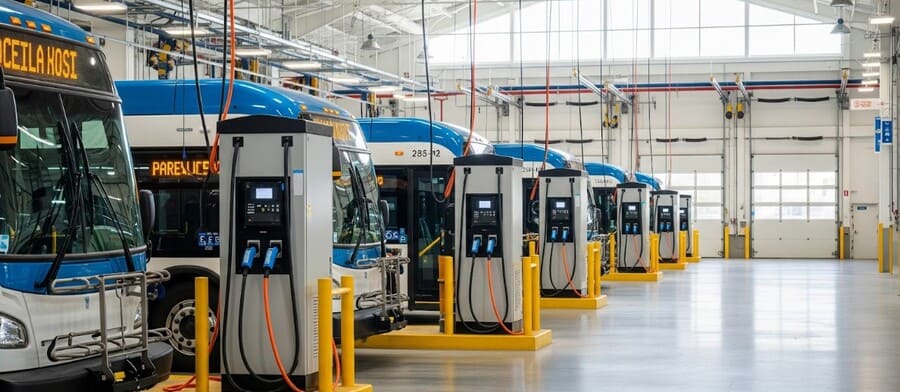

By
June 4, 2025

As electric vehicle (EV) adoption accelerates in public transit and logistics, charge scheduling for electric buses and trucks has become essential for reliable and cost-efficient operations. Charging a large EV fleet is no longer as simple as plugging in overnight—fleet managers now need smart, automated solutions to plan and optimize charging sessions across shared infrastructure and limited power supply.
EV charge scheduling is the process of automatically planning when and how electric vehicles are charged at a depot. By integrating with route planning software and vehicle telematics, charge scheduling systems ensure that:
With growing electric fleets and limited depot chargers, the traditional one-to-one charger-to-vehicle model is no longer viable. Multiple buses or trucks often share chargers, and third-party vehicles—like vendor or contractor trucks—may also require access to depot charging stations.
EV charging scheduling solves this by prioritizing:
As the number of EVs per site grows, charge scheduling becomes critical for ensuring uptime and meeting service commitments.
Advanced charge scheduling systems integrate with leading route planning tools such as:
These integrations allow the charging schedule to dynamically update in response to:
Real-time data from vehicle telematics systems (such as SoC, location, battery health) ensures that the scheduler makes intelligent decisions based on the actual status of the fleet.
Effective electric fleet charge management requires coordination with the depot’s energy and power management systems (EPMS). A modern charge scheduling system accounts for:
By doing so, operators avoid grid overloads, reduce peak demand charges, and make better use of renewable energy sources.
With fleet electrification scaling up, depot operators are now planning charging sessions not just for the next few hours but for multiple days in advance. Smart EV charging optimization tools support long-range planning and real-time updates, providing transparency and flexibility as conditions evolve.
Charge scheduling represents the next evolution of smart EV charging. While traditional smart charging controls power levels and avoids overload, scheduling adds intelligence and prediction—factoring in route timing, energy cost, and charger availability.
With full-stack integrations, charge scheduling transforms electric bus and truck depots into resilient, efficient, and cost-optimized operations.
To learn more, you can request a demo or more information below.
Ampcontrol is a cloud-based software that seamlessly connects to charging networks, vehicles, fleet systems, and other software systems. No hardware needed, just a one-time integration.